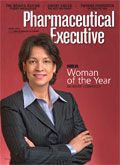A Challenging Harvest
Pharmaceutical Executive
Success in this harsh climate depends on seeing business through the eye of the customer
To climatologists, April is a transitional month, when the frozen fields of winter yield to showers that prime the soil for renewed growth. This month's issue of Pharm Exec tracks this same timeless pattern, but in reverse. Two feature stories illustrate how the next generation of industry leaders is managing the change from an era of plenty to today's harvest of scarcity, where the soil for science is fallow and the seeds of drug discovery take much longer to root.

William Looney
Our cover profile of 2010 HBA Woman of the Year honoree Deirdre Connelly of GSK, and a Q&A with Pfizer's Specialty Care business lead Geno Germano, both suggest that success in this harsh commercial climate depends on one overriding factor: the ability to read, interpret, and anticipate business conditions through the eye of the customer. This skill is followed closely by leadership acumen, where top management must set the example for clarity, consistency, and integrity in meeting business objectives.
Connelly's background makes her one of the few industry leaders with direct experience in the human resources function. HR has been a neglected aspect of management in flush times, but one which should garner increased visibility as companies look to wrest higher productivity from a smaller work force. One testimonial cites her approachability to junior staff, based on a simple reference point: "I don't know—teach me." Few words matter more now that responsibility for executing strategy is being pushed to a new generation of "empowered" managers often barely out of their thirties.
An adjunct to Connelly's curiosity is Geno Germano's commitment to the "light touch" in meeting tougher standards for access to high-priced specialty medicines. Strong analytics are critical, but represent a defensive mindset. Obtaining a premium price based solely on quantitative evidence of "value differentiation" is going to be much harder when it is sown in the parched terrain of patent expiries and genericization. It's best to venture a step beyond economics to mobilize the people power that drives partnerships. As Germano notes, this requires costly, time-intensive investments in human capital, where customers are engaged at an early stage in the product development cycle and are bonded to a service orientation that involves the entire resources of the organization for the long-term. It's a strategy drawn to complement the human profile—in other words, "customer facing."
The competitive advantage from embracing insight and intuition to get closer to customers is hard to quantify in the standard business plan. But a third feature this month, on the brave "neuro" world of cognitive enhancement therapies, suggests there may be a solution at hand. You guessed it: a new drug. Senior Editor Walter Armstrong tracks the scientific hurdles, ethical dilemmas, and regulatory fault lines confronting the evolving field of cosmetic neurology. Big Pharma is exploring potential applications against age-related conditions, but full use of the brain's softer right hemisphere is going to be needed to anticipate the reputational mine fields of spending scarce research dollars merely to make otherwise healthy people "smarter."
The April issue ends with a pessimistic brief examining the work of Lilly executive Bernard Munos, on the scope of the industry's productivity challenges in conducting R&D. Munos' calculations lead him to conclude that industry must embrace a new research model, as current efforts to address the gap in NCEs —including mergers, out-licensing, and cost cuts—are insufficient when measured against the impact of a risk-averse regulatory and payer climate. He notes that the trend toward industry consolidation is dangerous. Despite rhetoric to the contrary, no large organization has the tolerance for the "disruptive" innovation that tends to produce the most medically significant breakthroughs.
William Looney
Editor-in-chief
Addressing Disparities in Psoriasis Trials: Takeda's Strategies for Inclusivity in Clinical Research
April 14th 2025LaShell Robinson, Head of Global Feasibility and Trial Equity at Takeda, speaks about the company's strategies to engage patients in underrepresented populations in its phase III psoriasis trials.
Beyond the Prescription: Pharma's Role in Digital Health Conversations
April 1st 2025Join us for an insightful conversation with Jennifer Harakal, Head of Regulatory Affairs at Canopy Life Sciences, as we unpack the evolving intersection of social media and healthcare decisions. Discover how pharmaceutical companies can navigate regulatory challenges while meaningfully engaging with consumers in digital spaces. Jennifer shares expert strategies for responsible marketing, working with influencers, and creating educational content that bridges the gap between patients and healthcare providers. A must-listen for pharma marketers looking to build trust and compliance in today's social media landscape.
Pfizer, GSK Gain ACIP Recommendations for RSV and Meningococcal Vaccines
April 18th 2025The Centers for Disease Control and Prevention’s Advisory Committee on Immunization Practices voted to expand access to Pfizer’s respiratory syncytial virus vaccine Abrysvo for high-risk adults in their 50s and voted in favor of GSK’s meningococcal vaccine, Penmenvy, for streamlined adolescent protection.
